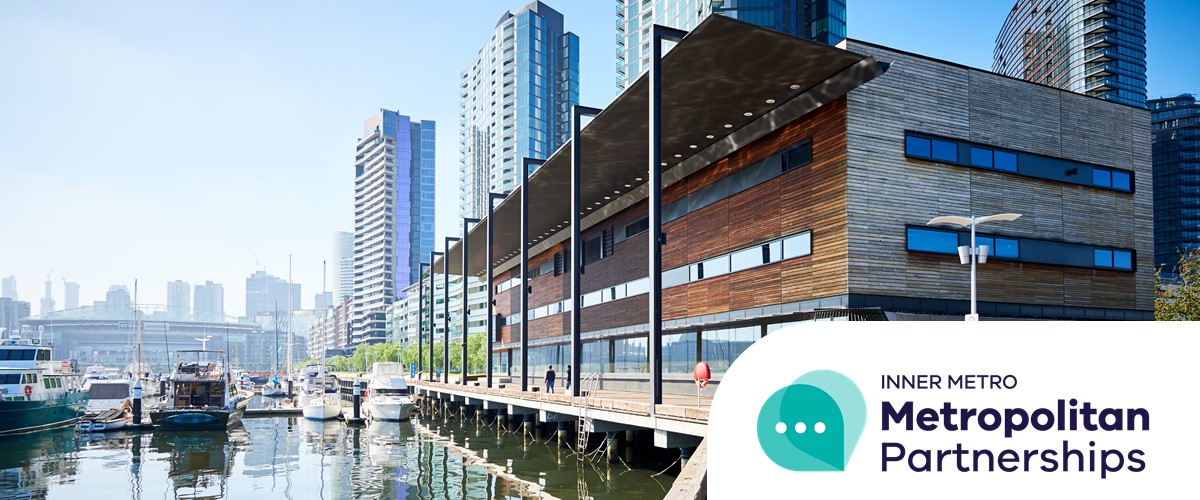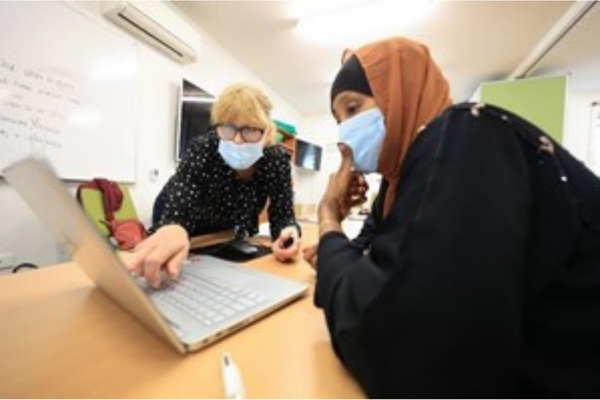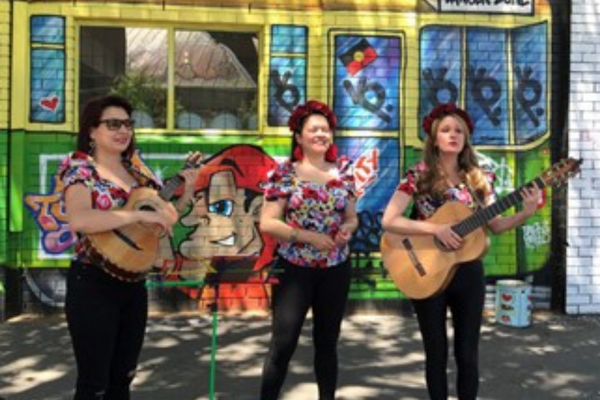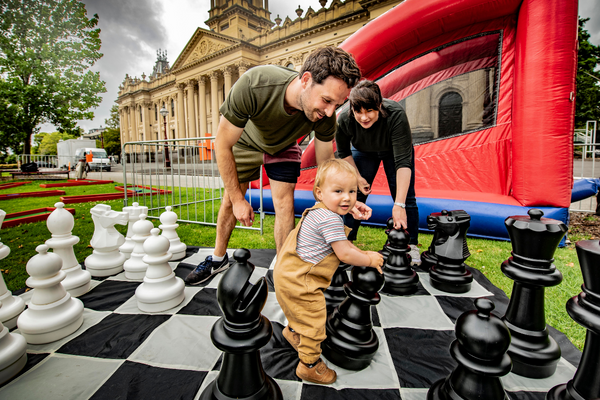
The Inner Metropolitan Partnership ran from 2017 to 2023. The Partnership engaged with local communities to advise the Victorian Government on the key priorities for jobs, services and infrastructure.
Former members
The Inner Metropolitan Partnership was made up of community and business representatives with varied backgrounds, experiences and networks and the CEO of each participating local government.
Members of the Inner Metropolitan Partnership were:
Anna Draffin, Chair
Tim Ryan, Deputy Chair
Mohammed Yassin
Charmaine Hunzwi
Martin Brennan
Hemant Kokularupan
Rohini Kappadath
What we've done
The Partnership invested in research and projects to further explore, and act upon, the priorities raised by the people of the west. The projects were commissioned by the Metropolitan Partnerships Development Fund and the insights were shared with government to inform policies and programs.
This project tackles the challenge of lack of access to renewable energy. While solar power may be abundant, many communities, families and organisations at a local level are unable to collect, store or share it, effectively locking them out access to this resource. The Neighbourhood Battery project will identify the local potential and feasibility of neighbourhood batteries. It will proactively engage and empower local communities to participate in neighbourhood battery projects.
Delivery of this project is being led by City of Melbourne, working in partnership with the Cities of Yarra and Port Phillip. It will engage energy providers such as Citipower / Powercorp, and Community Climate Action groups and Victorian State Department of Energy, Land, Water and Planning (DELWP).
This project is working to identify and document options and recommendations for practical, long-term sustainable coordination of food relief activities, which also has the potential to connect people to additional support services; and provide short-term opportunities for allocating funds for direct food relief.
Delivery of this project is being led by Port Phillip City Council, working with the Cities of Melbourne and Yarra.
The COIVD-19 pandemic shone a spotlight on the digital divide experienced by our CALD community.
The Multicultural Digital Inclusion project delivered individualised digital literacy training to CALD communities experiencing barriers to digital access and addressed the Partnership's priority of improved social connection.
Local community leaders were identified as mentors in a ‘train the trainer’ approach, enabling them to deliver digital literacy training in Mandarin, Vietnamese and English.
The project saw 17 mentors sign up to become a trainer, a 10-week computer skills course was delivered, a digital kid's holiday program was attended by 28 children, and 43 laptops were purchased and provided to mentors to keep after the life of the program.
Training was undertaken across five sites in the region, delivered in Partnership with Neighbourhood Houses Victoria and Yarra Libraries, with $60,000 in funding from MPDF.
The report demonstrates the success of delivering place-based programs which are co-designed with CALD communities and leverages existing relationships, to ensure that programs meet specific communities’ needs and aspirations.
The legacy of the program has seen five of the mentees enrol in further computer classes with their newfound skills and confidence, and there is currently a waitlist for both mentors and mentees wishing to join the program after hearing of its success.
Read the Multicultural Digital Inclusion Project's Final Report PDF, 6693.43 KB.

This project activated public spaces in four key activity centres in the City of Yarra, to promote social connectivity and the local economy which had been hard hit by the COVID-19 pandemic.
The activations focused on precinct-based place-making and business development activities, promoting creative industries, whilst facilitating marketing, business development, and social connection:
- The 'Everyday Nicholson' campaign ran via social media and spotlighted eight unique businesses along Nicholson Street, encouraging locals to get to know them better. The online presence for this campaign continues past the life of the grant delivery.
- Brunswick Street, Fitzroy saw 50 out of work artists employed to perform outdoors on street corners in the lead up to Christmas, bringing life back to the neighbourhood and encouraging shoppers to stay longer in the precinct.
- The ‘Local Swerve’ event at Collingwood Yards, provided work experience for eight young people, including some who reside in the Collingwood and Fitzroy housing estates, to produce a culturally appropriate Youth Festival, and was attended by over 400 people.
- Hospitality venues in Swan St, Richmond hosted events that drew crowds back to the precinct, with DJ’s providing live entertainment at four locations. The events were also live streamed via Reddit, Instagram, Facebook and YouTube. In person attendance was over 1400 people, with an additional 400 unique viewers online.
The project report identifies key learnings around the use of entertainment to revitalise spaces and attract people back to precincts. It demonstrates that activating public spaces can successfully promote social connectivity and the local economy, and shows the value of leveraging existing marketing channels targeted to relevant cohorts, and giving job opportunities to local people.
Read the Placemaking and Business Development Final Report PDF, 2121.56 KB.

The Partnership identified support for creative industries, social connectivity and local economic activity as key priorities for COVID-19 recovery.
This project delivered 37 activations across eight weekends, in several key activity centres in the City of Port Phillip. Over 20 activation providers and 40 entertainers were engaged.
A range of family friendly activations such as yoga classes, live music performances and giant games were delivered. Overall, the activations engaged approximately 3,000-5,000 people.
The report shows the success of activating public spaces to promote social connectivity and stimulate the local economy, with survey results indicating that 87% of participants stayed longer in the area because of the events.
Due to the project’s success, Port Phillip City Council will replicate the program in Carlisle Street, St Kilda in partnerships with the Carlisle Street Traders Association, and the Victorian Government’s COVIDSafe Outdoor Activation Fund. The program called “Autumn on Carlisle Street”, will include the installation of a new activity platform, and a scheduled series of musicians, kids activities and art.
Read the Summer Sessions Project Final Report PDF, 8491.67 KB.

Building on prior research from the Inner Metropolitan Partnership and Creative Victoria, this project tested recommendations to ensure the availability and affordability of workspaces for creative industries in inner Melbourne. It explored three sites for precinct opportunity plans: Collingwood, South Melbourne and the Fishermans Bend Employment Precinct.
Read the Supporting Enterprise and Creative Industries Final Report PDF, 12381.23 KB.
Based on ‘Housing First’ principles, and the Common Ground model, the Practice Manual provides guidance for the design, funding and delivery of congregate support housing. This is to support people who have experienced chronic homelessness with permanent housing that integrates support services.
The Manual was prepared by the Australian Housing and Urban Research Institute in collaboration with MGS Architects and Mind Australia for the City of Port Phillip and the Inner Metropolitan Partnerships.
Read the Common Ground Housing Model Practice Manual PDF, 11528.23 KB.
This work has informed the Government’s Big Housing Build initiative.
The Inner Metropolitan Partnership commissioned YLab, in consultation with the Department of Health and Human Services, Department of Education and Training and the Department of Premier and Cabinet, to review current work on the barriers and enablers for young people in the region to accessing quality mental health support.
Read the Understanding Young People's Access to Mental Health Services Final Report PDF, 3611.23 KB.
The Inner Metropolitan Partnership’s Affordable Housing Working Group commissioned a needs assessment, which included the development of a methodology to calculate affordable housing need across the region. The assessment will support the working group, and the participating councils, to develop planning mechanisms to facilitate the provision of affordable housing in the region.
Innovation and creative economies were first identified as a priority of the partnership in 2017. The rising cost of commercial floorspace has emerged as a critical barrier to entry for new enterprises in some parts of inner Melbourne – risking the economic sustainability and growth of creative industries start-ups, small businesses and small-scale manufacturers.
The partnership commissioned studies to understand the challenges faced by these enterprises and the mechanisms available to support them by maintaining and creating affordable workspaces.
Movement and Place studies were commissioned in three prominent transport sites in the inner metropolitan region.
The concept of Movement and Place recognises that transport links (roads, train stations, etc.) perform two functions: the movement of people and goods and they serve as destinations in their own right.
The studies engaged various stakeholders to develop visions and aspirations for Burnley, the Haymarket roundabout and boulevards of the biomedical precinct and St Kilda Junction to develop visions for these transport hubs in inner metropolitan Melbourne.
Local Government Areas
- City of Melbourne
- City of Yarra
- City of Port Phillip
Page last updated: 03/07/24